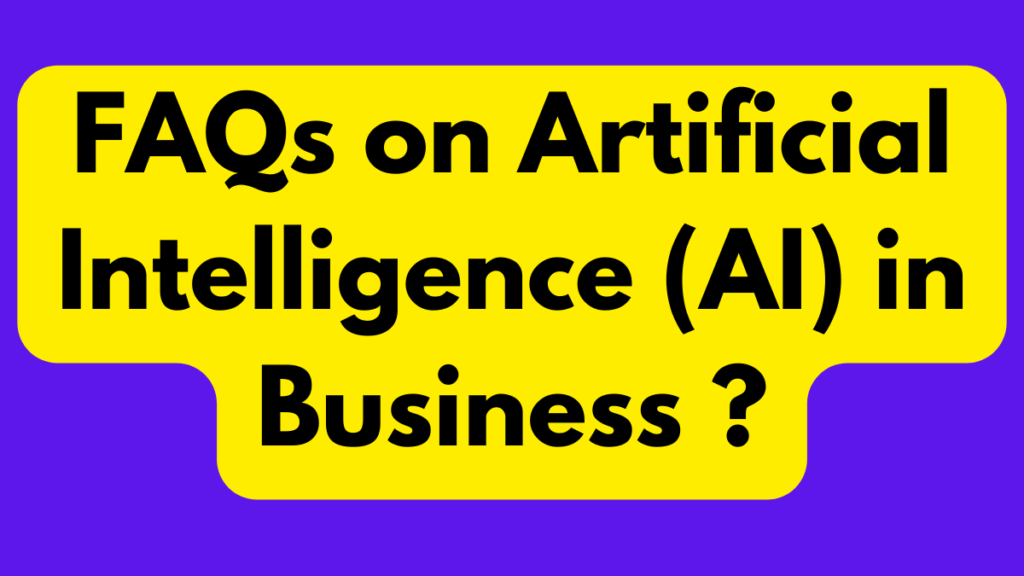How AI used in Business ? Artificial Intelligence (AI) has evolved from a futuristic concept to a practical and indispensable tool in various industries. In the business world, AI is not just a buzzword but a transformative force reshaping how companies operate, make decisions, and interact with customers. This article delves into the profound impact of AI on businesses, exploring its applications, challenges, implementation strategies, and future trends.

Understanding Artificial Intelligence (AI)
Before exploring how AI is used in business, it’s crucial to understand what AI is. AI refers to the development of computer systems that can perform tasks that typically require human intelligence. This includes learning, reasoning, problem-solving, understanding natural language, and perception. Machine learning (ML) and deep learning are subsets of AI that enable systems to learn and improve from experience.
AI in Business: A Transformative Force
AI is revolutionizing businesses in various ways, enhancing efficiency and innovation. Let’s explore key aspects:
Streamlining Operations: AI automates repetitive tasks, reducing human error and increasing operational efficiency. It optimizes workflows, from supply chain management to routine administrative tasks.
Enhancing Customer Experience: AI-powered chatbots and virtual assistants provide instant and personalized customer support. Natural language processing (NLP) enables systems to understand and respond to customer inquiries effectively.
Improving Decision-Making: Data-driven decision-making is empowered by AI algorithms that analyze vast datasets rapidly. This enables businesses to make informed and strategic decisions.
Predictive Analytics and Forecasting: AI’s ability to analyze historical data and identify patterns facilitates accurate predictive analytics. Businesses can forecast trends, demand, and potential issues.
Applications of AI in Different Business Sectors
AI is versatile and applicable across diverse industries, each benefiting from tailored solutions:
Artificial Intelligence (AI) has become a pivotal force across various industries, revolutionizing operations and fostering innovation. Let’s delve deeper into how AI is uniquely tailored to benefit specific sectors:

Healthcare: Transforming Diagnostics and Patient Care
AI’s impact on healthcare extends beyond the surface, significantly improving diagnostics, drug discovery, and patient-centric care. Through advanced algorithms, AI aids in the interpretation of medical images, enabling quicker and more accurate diagnoses. In drug discovery, AI accelerates the identification of potential candidates, reducing development timelines. Moreover, personalized medicine is enhanced through AI’s ability to analyze patient data, tailoring treatments based on individual genetic profiles. Predictive analytics and remote monitoring further empower healthcare professionals to anticipate and address patient needs proactively.
Finance: Empowering Financial Institutions with Precision
In the financial sector, AI acts as a powerful ally, contributing to fraud detection, algorithmic trading, and personalized financial advice. AI algorithms scrutinize vast datasets, identifying anomalies and patterns indicative of fraudulent activities. Algorithmic trading leverages AI’s ability to process real-time market data, optimizing trading strategies for maximum returns. Chatbots, powered by AI, revolutionize customer interactions by providing personalized financial advice, assisting with inquiries, and facilitating seamless transactions, thereby enhancing overall customer satisfaction.
Manufacturing: Precision and Efficiency through Automation
AI-driven robotics and automation redefine manufacturing processes, introducing precision and efficiency. Robotics, guided by AI algorithms, perform intricate tasks with unparalleled accuracy, leading to increased production efficiency. Predictive maintenance, a core AI application, minimizes downtime by predicting equipment failures before they occur. Quality control benefits from image recognition algorithms, ensuring the consistent production of high-quality goods. The integration of AI in manufacturing represents a paradigm shift towards smart and adaptive production systems.
Retail: Enhancing the Shopping Experience

In the retail sector, AI is a game-changer, offering solutions that optimize operations and elevate the customer experience. Inventory management becomes a streamlined process with AI-driven systems predicting demand, reducing overstock, and minimizing stockouts. Personalized recommendations, powered by AI algorithms analyzing customer preferences and behavior, create a tailored shopping experience. Facial recognition technology enhances security measures, preventing theft and ensuring a safer retail environment. Overall, AI transforms retail into a dynamic and customer-centric industry.
Marketing: Precision and Personalization in Campaigns
AI’s role in marketing is marked by precision and personalization. Personalized advertising, facilitated by AI algorithms analyzing user data, ensures that marketing messages resonate with individual preferences. Customer segmentation becomes more nuanced, allowing businesses to tailor their strategies to specific demographics. Sentiment analysis, another AI application, gauges public opinion, helping businesses make data-driven decisions. The optimization of digital marketing campaigns based on user behavior ensures that marketing efforts are not only targeted but also highly effective in engaging the intended audience.
The applications of AI in different business sectors are nuanced and transformative. From revolutionizing patient care in healthcare to enhancing customer experiences in retail, AI’s versatility is reshaping industries and fostering a new era of efficiency and innovation. As technology continues to advance, the potential for AI to drive positive change across diverse sectors is boundless.
Challenges and Ethical Considerations
While AI brings immense benefits, it also presents challenges and ethical considerations:
Bias and Fairness: AI algorithms can inherit biases present in training data, leading to unfair outcomes. Ensuring fairness and mitigating bias is an ongoing challenge.
Security Concerns: The use of AI in cybersecurity is crucial, but it also poses risks if AI systems are compromised. Ensuring robust security measures is imperative.
Job Displacement: The automation of tasks through AI raises concerns about job displacement. Businesses must navigate the ethical implications of workforce changes.
Ethical Use of AI: AI systems must be developed and used ethically. This involves transparency, accountability, and ensuring that AI respects privacy and human rights.
Implementation Strategies for Businesses
Successful implementation of AI requires careful planning and consideration of various factors:
Data Quality and Accessibility: Quality data is essential for AI algorithms. Businesses need accessible and well-curated data to train and improve AI models.
Talent Acquisition and Training: Hiring skilled professionals in AI and providing ongoing training ensures that businesses can harness the full potential of AI technologies.
Integration with Existing Systems: Smooth integration with existing systems is critical. Compatibility and interoperability facilitate a seamless transition to AI-driven processes.
Regulatory Compliance: Adherence to data protection and privacy regulations is crucial. Businesses must stay informed about evolving regulatory frameworks for AI.
Case Studies: Successful AI Integration
Examining real-world examples demonstrates the practical impact of AI in diverse business scenarios:
Amazon’s AI-Powered Recommendations: Amazon’s recommendation engine uses AI algorithms to analyze user behavior and suggest products, significantly boosting sales and customer satisfaction.
Google’s DeepMind in Healthcare: Google’s DeepMind has been applied to healthcare for tasks like image analysis and predicting patient deterioration, enhancing diagnostic accuracy.
IBM Watson in Finance: IBM Watson is utilized in the finance sector for risk management, fraud detection, and enhancing customer interactions through AI-driven chatbots.
Future Trends and Innovations in AI for Business
As AI continues to evolve, several trends and innovations are shaping its future:
Explainable AI (XAI): Enhancing transparency in AI algorithms to make their decision-making processes understandable and interpretable by humans.
AI-Enhanced Creativity: AI systems contributing to creative processes, such as content creation, design, and artistic endeavors.
Edge AI and IoT Integration: The integration of AI processing at the edge of networks, enhancing efficiency and reducing reliance on centralized computing.
Legal Implications and Regulations
Navigating the legal landscape is crucial for businesses integrating AI:
Data Privacy and Protection: Ensuring compliance with data protection laws, safeguarding customer data, and respecting privacy rights.
Compliance with AI Regulations: Staying abreast of evolving regulations specific to AI, including those addressing fairness, accountability, and transparency.
Liability and Accountability: Determining responsibility in the event of AI-related issues and ensuring accountability for ethical use and outcomes.
Pros & Cons of AI in Business
| Pros of AI in Business | Cons of AI in Business |
| 1. Increased Efficiency: | 1. High Initial Costs: |
| – Streamlines processes, reducing manual efforts. | – Implementation of AI systems can be expensive, especially for small businesses. |
| – Accelerates decision-making with real-time data analysis. | – High upfront costs may pose a barrier to entry for some organizations. |
| – Optimizes resource allocation and workflow management. | |
| 2. Improved Accuracy: | 2. Lack of Understanding: |
| – Reduces errors and enhances precision in tasks. | – Some stakeholders may lack a clear understanding of how AI works, leading to skepticism or resistance. |
| – Enhances data analysis, minimizing the risk of human error. | – Misalignment between AI capabilities and user expectations can hinder effective utilization. |
| – Enables predictive analytics, anticipating trends and outcomes. | |
| 3. Enhanced Customer Experience: | 3. Data Privacy Concerns: |
| – Personalizes interactions, improving customer satisfaction. | – AI systems often rely on vast amounts of user data, raising concerns about privacy and data protection. |
| – Provides prompt and tailored customer support through chatbots. | – Striking the right balance between personalization and data privacy is a continual challenge. |
| – Facilitates proactive issue resolution and feedback analysis. | |
| 4. Scalability and Flexibility: | 4. Job Displacement Concerns: |
| – Adapts easily to changing business needs and growth. | – Automation driven by AI may lead to job displacement in certain industries, raising ethical and societal concerns. |
| – Scales operations efficiently, accommodating increased workloads. | – Reskilling the workforce to align with evolving job requirements becomes essential. |
| – Supports a diverse range of applications across industries. | |
| 5. Data Analysis and Insights: | 5. Dependence on Data Quality: |
| – Analyzes large datasets rapidly, extracting valuable insights. | – The accuracy and reliability of AI outputs heavily depend on the quality and relevance of the input data. |
| – Facilitates data-driven decision-making, contributing to strategic planning. | – Inaccuracies in data can lead to flawed analyses and subsequent business decisions. |
| – Identifies patterns and trends that may go unnoticed by human analysis. |
AI in business presents a myriad of advantages, optimizing processes and driving innovation. However, challenges such as high costs, ethical concerns, and potential job displacement require careful consideration and proactive management. Striking a balance between leveraging AI’s capabilities and addressing its limitations is essential for organizations embracing this transformative technology.
The impact of artificial intelligence (AI) on jobs is a subject of ongoing debate and study. While AI has the potential to create new opportunities and enhance productivity, it also raises concerns about job displacement and shifts in the employment landscape. Let’s explore both the positive and negative aspects of AI’s impact on jobs:
Positive Impact on Jobs:
- Creation of New Job Roles: The adoption of AI often leads to the creation of new job roles that focus on designing, implementing, and maintaining AI systems. This includes roles such as AI specialists, data scientists, and machine learning engineers.
- Increased Productivity: AI can automate routine and repetitive tasks, freeing up human workers to focus on more complex and creative aspects of their jobs. This can lead to increased productivity and efficiency in various industries.
- Enhanced Skills and Training Opportunities: The integration of AI necessitates upskilling and reskilling of the workforce. This presents opportunities for individuals to acquire new skills, making them more competitive in the job market.
- Improved Job Safety: In industries with hazardous working conditions, AI-powered robots can perform dangerous tasks, reducing the risk of workplace accidents and injuries.
Negative Impact on Jobs:
- Job Displacement: Automation driven by AI has the potential to replace certain manual and routine tasks, leading to job displacement in industries like manufacturing, customer service, and transportation.
- Shift in Job Requirements: The skills required for many jobs may change with the integration of AI. Workers may need to adapt and acquire new skills to remain relevant in their roles.
- Concerns About AI Bias: AI algorithms can inherit biases present in training data, leading to biased decision-making. This raises concerns about fairness, especially in areas like hiring and lending, potentially impacting certain demographics more than others.
- Ethical and Societal Implications: The widespread adoption of AI raises ethical questions about the societal impact of job displacement and the concentration of economic power. Striking a balance between technological advancements and societal well-being is a critical consideration.
Mitigating the Negative Impact:
- Investment in Education and Training: Governments, businesses, and educational institutions can invest in programs that provide training and education in AI-related skills. This can prepare the workforce for the evolving job landscape.
- Ethical AI Development: Developers and organizations must prioritize ethical considerations in AI development to mitigate biases and ensure fairness. Transparent and accountable AI systems can help build trust.
- Government Policies and Regulations: Governments can play a role in establishing policies and regulations that guide the ethical use of AI and address potential job displacement. This may include creating frameworks for responsible AI deployment.
- Collaboration Between Humans and AI: Emphasizing the collaborative nature of AI-human partnerships can foster a more positive perception. AI can serve as a tool that complements human skills rather than a replacement.
The impact of AI on jobs is multifaceted, with both positive and negative aspects. While AI has the potential to transform industries and create new opportunities, proactive measures must be taken to address challenges such as job displacement and ethical considerations. A holistic approach that combines technological advancements with a focus on education, ethical development, and thoughtful policy-making is essential to navigate the evolving relationship between AI and the workforce.
FAQs on Artificial Intelligence (AI) in Business

| Question | Answers |
| 1. What is Artificial Intelligence (AI)? | AI refers to the development of computer systems that can perform tasks requiring human intelligence, such as learning and problem-solving. |
| 2. How is AI used in healthcare? | AI is applied in healthcare for diagnostics, drug discovery, personalized medicine, predictive analytics, and remote monitoring, enhancing patient care and outcomes. |
| 3. What role does AI play in finance? | In finance, AI is used for fraud detection, algorithmic trading, personalized financial advice, and chatbots for customer inquiries and transactions. |
| 4. How does AI optimize manufacturing processes? | AI-driven robotics and automation optimize manufacturing by enhancing precision, minimizing downtime through predictive maintenance, and improving quality control with image recognition. |
| 5. What are the applications of AI in retail? | Retailers leverage AI for inventory management, personalized recommendations, facial recognition for security, and overall enhancement of the shopping experience. |
| 6. How is AI used in marketing? | AI in marketing includes personalized advertising, customer segmentation, sentiment analysis, and optimization of digital marketing campaigns based on user behavior. |
| 7. What challenges does AI face in business? | Challenges include high initial costs, lack of understanding among stakeholders, data privacy concerns, job displacement worries, and the need for ethical use of AI. |
| 8. How does AI impact job displacement? | Automation driven by AI has the potential to replace certain manual and routine tasks, leading to job displacement in specific industries, raising ethical and societal concerns. |
| 9. What measures can mitigate job displacement? | Mitigation measures include investment in education and training, ethical AI development, government policies, and emphasizing collaboration between humans and AI. |
| 10. What is the future outlook for AI in business? | The future of AI in business is dynamic, with ongoing advancements. Trends include explainable AI, AI-enhanced creativity, and integration with the Internet of Things (IoT). |
Conclusion
In conclusion, the integration of Artificial Intelligence (AI) into business operations signifies a profound shift in how industries operate and innovate. The versatile applications of AI, from healthcare to marketing, promise increased efficiency, improved accuracy, and enhanced customer experiences. However, challenges such as high initial costs, ethical concerns, and the potential for job displacement require careful consideration. The positive impact of AI on job creation, productivity, and safety is substantial, but organizations must proactively invest in education and ethical development to mitigate potential drawbacks. As AI continues to evolve, fostering collaboration between humans and AI, transparent practices, and a commitment to addressing societal concerns will be pivotal. The future outlook for AI in business is one of continuous growth, with emerging trends promising even more sophisticated and responsible applications across diverse sectors. Striking the right balance between technological innovation and ethical considerations is crucial for a sustainable and inclusive AI-driven future.
Disclaimer:
The information provided in this article is for general informational purposes only and should not be construed as professional advice. Readers are advised to seek appropriate guidance and conduct their own research for specific business decisions.
